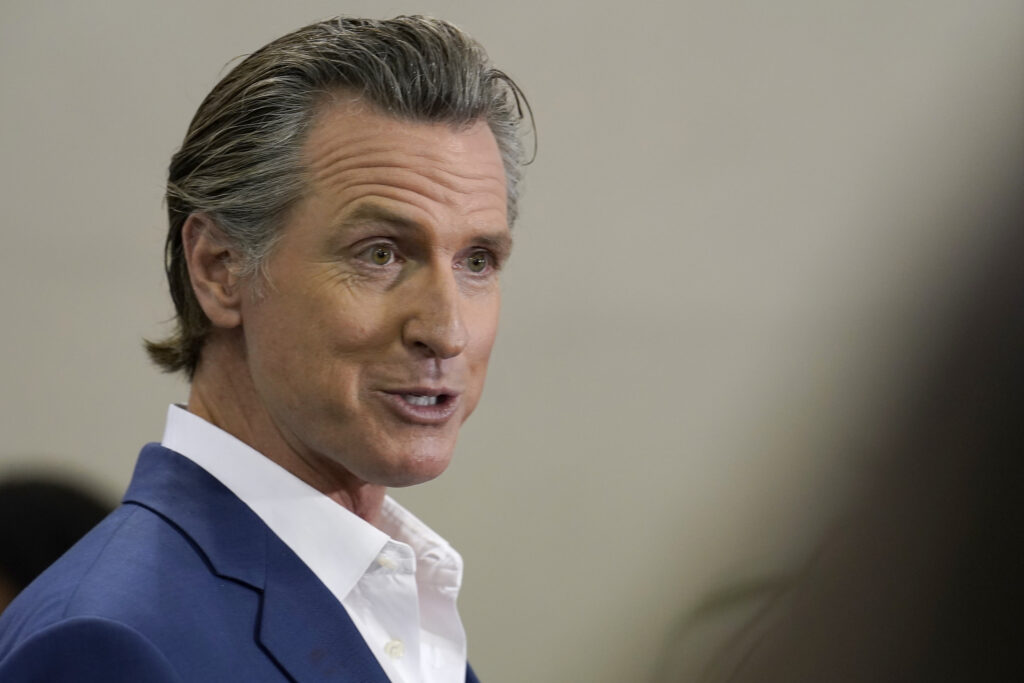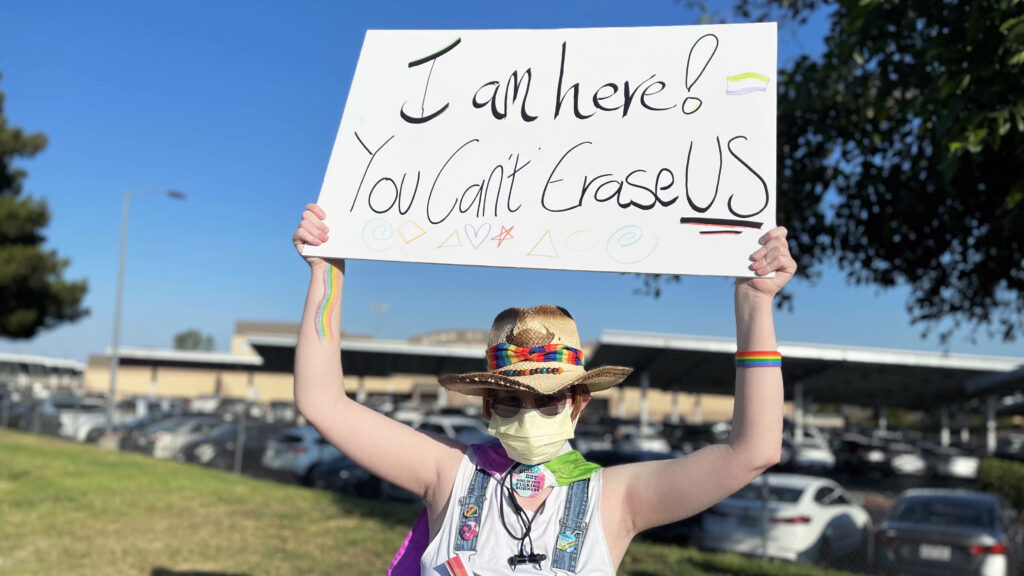
Gov. Gavin Newsom
Credit: AP Photo/Rich Pedroncelli, File
Three months ago, in a confrontation over the inclusion of LGBTQ+ content, Gov. Gavin Newsom warned the politically conservative Temecula Valley Unified school board that either it replaces an outdated history social studies textbook for elementary school students or the state would buy an updated version on the district’s dime, and fine it for its recalcitrance.
There was no High Noon, as it turned out. The school board backed down within days and agreed to purchase a more inclusive textbook that a committee of 47 Temecula Valley teachers had recommended.
But Newsom is about to gain the formal authority to head off similar actions by other like-minded school boards. On Thursday, the Legislature passed Assembly Bill 1078, which his advisers helped craft. The nearly party-line votes of 30-9 in the Senate and 55-16 in the Assembly provided the two-thirds “urgency” margin the governor wanted for the bill to take effect as soon as he signs it.
The bill, authored by first-term Assemblymember Corey Jackson, D-Perris, in Riverside County, would expand existing state law, including the 2011 FAIR Act, which requires instructional materials to accurately portray the history, viewpoints and experiences of California’s diverse and underrepresented racial, ethnic, and other groups, including LGBTQ+ Californians. It says that school boards that refuse to include materials or remove library books or textbooks that would interfere with the FAIR Act would be committing censorship and discrimination.
“Schools may not adopt textbooks or other materials or sponsor instruction or activities that promote discriminatory bias against or reflect adversely on persons” on a range of characteristics, including race, ethnicity, nationality, gender, gender identity, gender expression, and religion, wrote Newsom, Attorney General Rob Bonta and State Superintendent of Public Instruction Tony Thurmond, a sponsor of AB 1078, in a June 1 letter that referred to the FAIR Act. It was sent to all county and district superintendents and charter school administrators.
AB 1078 would create a new complaint process for parents and other residents to ask the state superintendent of public instruction to investigate and overrule a board’s book ban if found to violate the FAIR Act or other anti-discrimination laws. California school librarians report that orders to remove books more often come not from school boards but from principals pressured by parents angered by sexually graphic novels or what they consider age-inappropriate books on gender.
In a situation where the superintendent determines that a district school board failed to provide students with sufficient instructional materials in order to avoid FAIR Act compliance, the state department of education would order and provide the textbooks that students needed and fine the district.
Newsom praised the quick passage of the bill Thursday, saying it would send a message to school boards not to put their own political agenda ahead of the education rights of children.
“California is the true freedom state: a place where families — not political fanatics — have the freedom to decide what’s right for them,” Newsom said. “With the passage of this legislation that bans book bans and ensures all students have textbooks, our state’s Family Agenda is now even stronger. All students deserve the freedom to read and learn about the truth, the world, and themselves.”
But Bill Essayli, a first-term Republican assemblymember from Norco, in Riverside County, said that the real intruders on freedom are Newsom and state leaders who are running roughshod over school boards that families chose to elect.
“You have Sacramento politicians who do not like decisions being made by duly elected school boards, and are trying to erode their control and attack their authority,” Essayli said. “This should be viewed as nothing short of an attack on democracy. And that’s something that we must be very vigilant of.”
While Newsom had Temecula Valley and rear-guard tactics of conservative boards in mind, the new complaint system could prompt people with opposite politics to demand action against materials and curriculums they claim are discriminatory. Jewish groups have characterized Santa Ana Unified’s ethnic studies treatment of the Arab-Israeli struggle as anti-Semitic. The newly formed Los Angeles-based Coalition for Empowered Education, which says it opposes “dogmatic, politicized agendas in K-12 education across the country,” could be motivated to file complaints of bias in the Liberated Ethnic Studies curriculums adopted by some California districts.
Jackson said he foresees complaints against districts that have banned the teaching of critical race theory, a school of thought that analyzes white privilege and the persistent and enduring forms of institutionalized racism. Jackson said districts are banning critical race theory as a means to suppress honest discussions of race. But only an investigation could establish a school board’s true intention, he said.
The problem, Essayli countered, is that “the complaint process is extremely subjective. It puts the determination in the hands of another politician (the state superintendent of public instruction) who has political motives.” Disputes like these should be done by an impartial judge through a lawsuit, he said.
Troy Flint, the school boards association’s chief information officer, said the uncertain scenarios that the bill could produce are a reason CSBA opposed the bill.
“There are a number of different ways that people could apply this law beyond what was intended. That’s a byproduct of the fact that AB 1078 was reactive,” he said.
Flint said the school boards association is troubled that complainants will be able to file directly with the state superintendent, who could intervene without giving school boards an opportunity to respond before making a finding.
Jackson said he wasn’t concerned about people filing complaints. “I really think that no matter what a parent’s concerns are, they deserve to be investigated. Now, they might not like the outcome of the investigation. But this is not meant to exclude people.”
He said he would watch the complaint process unfold. “If the state superintendent or the governor feels like this is becoming a problem, then we will address it with cleanup language next year,” he said.
Incensed by Temecula Valley’s board
Newsom was drawn into the issue by the resistance of Temecula Valley’s newly conservative majority to buy an urgently needed new history-social studies series.
The committee of teachers and parents who volunteered to review proposed textbooks had vetted and recommended Social Studies Alive! Its fourth-grade textbook on California history included a section on the gay rights movement, including the struggle for gay marriage. The majority said they opposed “sexualized” materials for elementary students and the inclusion in a teacher’s guide of material on gay rights activist Harvey Milk, the first gay elected official in California, whom board President Joseph Komrosky denigrated as a pedophile.
The board’s plan to delay that approval meant Temecula Valley would have begun the year with a 17-year-old out-of-print textbook with insufficient copies for every student, a violation of state law. The state already had the authority to order new textbooks and charge the district in such a situation.
The delay also created a dilemma for teachers. As Carolyn Thomas, a Temecula Valley Unified teacher, told EdSource in May, “We also find ourselves in the precarious position of determining how to teach the required state standards while simultaneously complying with our employer’s decision to restrict us from teaching about the historical contributions of diverse individuals.”
AB 1078 would additionally impose a financial penalty, not for a FAIR Act violation per se, but for a district’s intentional inaction to provide all students with enough textbooks at the start of a year. The penalty would amount to what a district received a decade ago when the state still earmarked funding for textbooks and materials, adjusted for inflation. The Legislative Analyst’s Office estimated that would amount this year, in today’s dollars, to about $95 per student or $950,000 for an average district with 10,000 students. For 27,000-student Temecula Valley, that would have been about $2.6 million.
Jackson said he believes other districts with “extremist” boards have adopted Temecula Valley’s strategy of delay — ignoring buying new textbooks because they include covering the deep history of racism in America and perspectives on ethnicity and gender. “So they are gaming the system,” he said.
Essayli said that Jackson is reading into their motives, and “I don’t think that is proper to do.”
AB 1078 had the support of the California Federation of Teachers, the ACLU and some organizations advocating for students of color. Opponents included the county school boards in County and Placer counties, the California Policy Center and the state school boards association.




